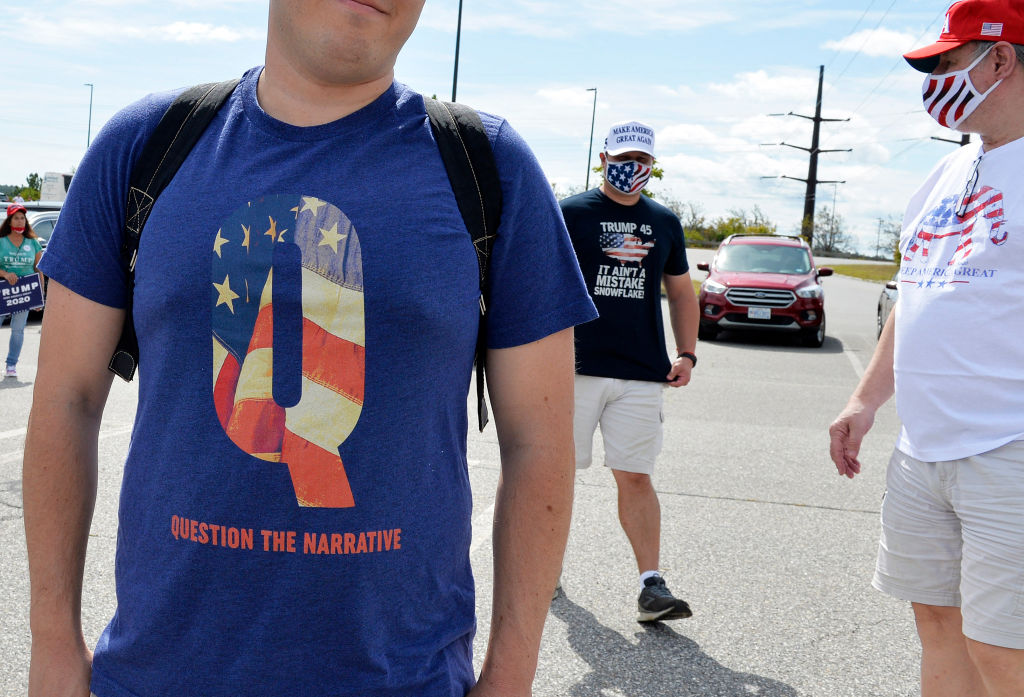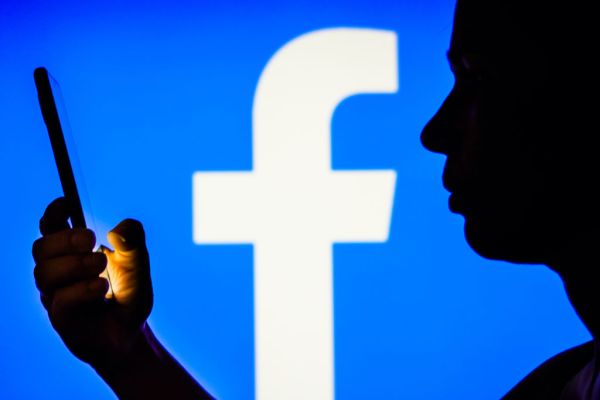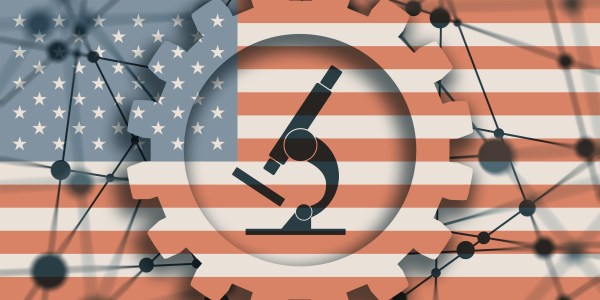Donald Trump is not the unprincipled, narcissistic boor the mainstream media would have you believe. In fact, he is a hero who spent his presidency battling a shadowy cabal of liberal elites who control our political and cultural institutions and who abuse children and drink their blood. Or so believe adherents of QAnon, a conspiracy theory that began on obscure message boards in 2017 and has since exploded into the national consciousness—and even the halls of Congress.
In her new book The Quiet Damage: QAnon and the Destruction of the American Family, journalist Jesselyn Cook examines the profound damage that belief in QAnon can have on personal relationships. Cook intended the book, as she puts it, to give the reader “a nuanced understanding of belief in the unbelievable” and to spotlight how obsession with conspiracy can lead to QAnon believers’ families being “torn apart at the seams.” But while the book is a thoroughly reported and sympathetic portrait of its subjects, it undercuts the solutions it offers by denying the QAnon adherents full agency over their beliefs.
The book grew out of a Huffington Post article Cook published in 2021 detailing how the children of QAnon believers were desperately trying to “deradicalize” their parents. After its publication, Cook says, she got hundreds of emails from people in similar predicaments.
But The Quiet Damage is not the book Cook set out to write. At first, she was convinced that a “greed-corrupted information ecosystem” warped by “profit-maximizing social media algorithms,” media personalities and online influencers, and “a growing faction of the nation’s leaders” was to blame for the rise of QAnon. Cleaning up the polluted information environment, she thought, involved regulating tech companies, teaching people how to tell real information from fake, and countering the latter with fact checks.
She soon learned that the problem was much more complex. Believers in QAnon and other conspiracy theories were not motivated by “a desire to be accurately informed, but a need to be internally comforted.” This realization had profound implications for how to prevent people from believing in conspiracy theories in the first place, which, she became convinced, required ensuring that their material and emotional needs were met. And it also dramatically altered her prescription for how to help people break away from conspiracy theory thinking. She came to believe the optimal solution was “gently chipping away at the fantasy while helping the person reach a point at which they can begin to rewrite their story.”
The Quiet Damage tells the stories of five pseudonymous subjects, each of whom came to believe fervently in QAnon: Emily, a successful attorney from rural Tennessee; Matt, a producer at an evangelical radio station in Missouri; Doris, a retiree living in a college town in Alabama; Alice, a middle-aged hippie from the Bay Area; and Kendra, a lower-class woman living in Detroit.
The book convincingly presents the circumstances that made them vulnerable to conspiracy theories in the first place. That said, it stumbles when identifying how these individuals came to believe in QAnon. The portions that address this issue read much more like the book Cook initially intended to write, with her subjects’ belief in QAnon portrayed as an evil that has been visited upon them by malevolent outside forces rather than something over which they have meaningful control.
Outsiders who found a community.
Social scientists have repeatedly found that people who are marginalized—or believe themselves to be so—are substantially more vulnerable to conspiratorial thinking. The reason is straightforward: It can be comforting to believe that your difficult circumstances are the result of powerful outside forces conspiring to keep you down. And of course, just because you’re paranoid doesn’t mean they’re not out to get you.
Marginalization can take on many forms, and the book’s subjects, each of whom had faced profound difficulties, demonstrate the range of circumstances that can make a person vulnerable to belief in conspiracy theories. For instance, Emily became a single mother when her gambling-addicted, philandering husband killed himself. She repressed her grief and focused on raising her children, but when they grew up and moved away, she was left with virtually no social circle and unresolved resentment at her husband. Matt had disabling pain that made it difficult for him to contribute around the house, straining his marriage. Doris was an elderly woman confronting increasing isolation when a cancer misdiagnosis led her to alternative medicine and, as the COVID-19 pandemic unfolded, to Q.
In QAnon, each of the five found an explanation for why things weren’t quite right in their lives. Perhaps even more importantly, each found a community of other believers who helped them feel welcomed, special, and important. As their mania grew, validation from fellow believers became increasingly important—especially as their own friends and family began to distance themselves or cut off contact altogether.
But vulnerable circumstances alone aren’t enough to make someone a conspiracy theorist. Ultimately, people choose what they believe, and many people in dire straits never fall into conspiratorial thinking.
Choice versus exploitation.
It’s important to understand how people’s “circumstances and choices” (emphasis mine) lead them to believe in conspiracy theories such as QAnon, Cook explains in the book’s prologue. Why? Because only by recognizing adherents’ “fundamental humanness” is it possible to “truly consider what real solutions could look like.”
Yet in Cook’s telling, her subjects aren’t responsible for their belief in QAnon. Rather, it is an evil that has been visited upon them by the right-wing media, unscrupulous tech companies, and cynical influencers. The author describes profit-seeking creators whose content was “artificially recommended” to users by social media giants whose “hidden hand” works to “warp individual users’ perceptions of society . . . in pursuit of corporate profit.”
The trouble with this framing is that most people in vulnerable circumstances do not end up believing that a cabal of satanist pedophiles is ruining the world for profit and pleasure. In the book, Kendra and her sister Tayshia both grew up in violent neighborhoods and faced racism from the white students at the private school they attended on a voucher. Yet Tayshia finds productive outlets for her trauma in advocacy and community organizing, and she is able to see her sister’s conspiracy theories for what they are. Much as she wants to fight what she views as fundamental injustice, she never falls down the QAnon rabbit hole.
Cook never accounts for why people in similar circumstances to QAnon obsessives are never tempted by the conspiracy theory. That’s an important question for understanding how conspiracy beliefs propagate, but it is obscured by the book’s implication that outside actors bear the lion’s share of the blame for people taking up such beliefs.
Nor is this simply a question of understanding how people come to believe in conspiracy theories—it also has significant implications for how we assess QAnon believers’ moral culpability for the impacts of their obsession with the conspiracy world. Doris and Alice imply or outright accuse their partners of being abusive for questioning their beliefs; Matt spends so much time researching QAnon on the internet that his wife feels abandoned. The notion that they can’t be held fully responsible for what their beliefs lead them to do, and the impact this has on their loved ones, is a patronizing approach that unnecessarily excuses behavior that is the believer’s fault.
Returning to reality.
Even more significantly, denying QAnon adherents agency over their beliefs undercuts the book’s conclusion about how to most effectively prevent people from buying into conspiracy theories and breaking them out of a conspiratorial worldview.
Experts in deradicalization and conspiracy theory deprogramming have come to recognize that many of the favored strategies for responding to conspiracy theories, such as expert fact-checking or labeling false information on social media, serve only to drive people further into their conspiratorial beliefs. After all, if the powerful elites are trying to suppress the information you’re sharing about them, surely you must be onto something.
Instead, the most effective way to bring people back to reality is for individuals they trust to engage with them in good faith—to show interest in their beliefs, to ask questions, to find common ground, and to calmly identify why there are points of disagreement. The key is to treat one’s interlocutor with dignity, even when they express views that are outlandish or obscene. It is an approach that requires an enormous amount of patience, empathy, courage, and most of all, respect.
The Quiet Damage illustrates this approach to deprogramming in highlighting how Alice’s father and fiancée engage with her belief in QAnon. Rather than trying to confront her or cut her out of their lives entirely, as other subjects’ family and friends did, the two listen to her attentively. They set strict boundaries (her fiancée limits their discussion of what he calls “politics” to one night a week) and are careful never to feign agreement where none exists, but they treat her as a whole person whose views are worthy of consideration.
In response, Alice opens up to the possibility that her beliefs might be wrong and that the hours a day she spends researching and sharing them might not be worth it. These realizations come gradually as her loved ones use parallel techniques to help her probe the limits of her faith in QAnon.
In his conversations with her, Alice’s father employs “motivational interviewing,” a strategy which asks her to consider whether—even if everything she had learned about QAnon was true—her “research” and posts were likely to make any difference or were worth the terrible damage they had wrought on her relationships. At the same time, her fiancée used “Socratic questioning,” a process by which a person asks open-ended questions that probe why someone believes something—and whether those beliefs are grounded in fact.
Gradually, these approaches worked on Alice. She began to question her beliefs and pull back from her research and posting. And while she clearly missed the community she had with other QAnon adherents, she began to slowly try to repair the real-world friendships that she had destroyed.
Pulling someone out of conspiracy theory beliefs requires treating the conspiracy theorist with respect. But this respect is impossible if one insists on infantilizing believers in QAnon or other conspiracy theories by treating them as if their beliefs come from malevolent outside actors rather than their own choices. Indeed, if outside actors are to blame for conspiracy theories as damaging as QAnon, then censorship and fact checking are legitimate, perhaps necessary, responses.
Because conspiracy theorists have a remarkable resistance to facts that are inconsistent with their worldview, trying to hide information from them or confront them will typically lead to them becoming even further entrenched in their views. It is the exact opposite of the strategy needed, as Cook recognizes. But it is nonetheless the strategy that her book’s discussion of how its subjects came to QAnon suggests.
The Quiet Damage is an admirable project—an earnest attempt to see the humanity in people with a deeply disturbing worldview. To the extent it falls short, it does so largely out of sympathy for its subjects. But in failing to treat them as people with agency over their beliefs, the book does them and other conspiracy adherents a disservice by obscuring the conditions necessary to bring them back to reality.









Please note that we at The Dispatch hold ourselves, our work, and our commenters to a higher standard than other places on the internet. We welcome comments that foster genuine debate or discussion—including comments critical of us or our work—but responses that include ad hominem attacks on fellow Dispatch members or are intended to stoke fear and anger may be moderated.
With your membership, you only have the ability to comment on The Morning Dispatch articles. Consider upgrading to join the conversation everywhere.